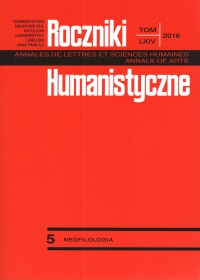The Orthographical Representation of {-NESS}, {-SHIP}, {-DOM} and {-HOOD} in the First Printed Editions of English Psalms
Abstract
The paper analyses the spelling conventions of common derivational suffixes {‑NESS}, {-SHIP}, {-DOM}, and {-HOOD} employed by the printers of the first three editions of English Psalms translated from Latin by George Joye. The analysis of the differences between the three editions of Joye’s Psalms points to the Antwerp 1534 edition printed by Martin Emperor as the most innovative in introducing certain spelling variants usually associated with much later texts. This, in turn, testifies to the important role of popular Biblical texts in the process of spelling standardisation.
References
Anderson, Christopher M. 1862. The Annals of the English Bible. Volume 1. Revised Edition by Hugh Anderson. London: Jackson, Walford, and Hodder.
Brewer, John Sherren, Robert Henry Brodie, and James Gairdner. 1862–1932. Letters and Papers, Foreign and Domestic, of the Reign of Henry VIII: Preserved in the Public Record Office, the British Museum, and elsewhere in England. London: Longman, Green, Longman, and Roberts.
Butterworth, Charles C. 1941. The Literary Lineage of the King James Bible, 1340–1611. Philadelphia: University of Pennsylvania Press.
Butterworth, Charles C. 1953. The English Primers (1529–1545). Their Publication and Connection with the English Bible and the Reformation in England. Philadelphia: University of Pennsylvania Press.
Butterworth, Charles C. and Allan G. Chester. 1962. George Joye (1495?–1553). A Chapter in the History of the English Bible and the English Reformation. Philadelphia: University of Pennsylvania Press.
Charzyńska-Wójcik, Magdalena. 2013. Text and Context in Jerome’s Psalters: Prose Translations into Old, Middle and Early Modern English. Lublin: Wydawnictwo KUL.
Charzyńska-Wójcik, Magdalena. 2014. “The Secrets of a Sixteenth-Century Psalter: In Praise of Circumstances.” Language and Literary Studies of Warsaw 4: 135–158.
Christman, Victoria. 2015. Pragmatic Toleration: The Politics of Religious Heterodoxy in Early Reformation Antwerp, 1515–1555. Rochester: University of Rochester Press.
Clebsch, William A. 1964. England’s Earliest Protestants 1520–1535. New Haven: Yale University Press.
Daniell, David. 1994. William Tyndale: A Biography. New Haven and London: Yale University Press.
Darlow, Thomas Herbert and Horace Frederick Moule. 1903. Historical Catalogue of the Printed Editions of Holy Scripture in the Library of the British and Foreign Bible Society. Volume 1. English. London: The Bible House.
Duffield, Gervase, E. 1964. The Work of William Tyndale. Appleford: Sutton Courtenay Press.
Duffield, Gervase, E. 1971a. “The First Psalter Printed in English.” Churchman 85: 291–93.
Duffield, Gervase, E., ed. 1971b. The Psalter of David. Aretius Felinus (Martin Bucer) 1530. Introduction by Gervase E. Duffield. Appleford: Sutton Courtenay Press.
Eadie, John. 1876. The English Bible: The External and Critical History of the Various Translations of the Scriptures, with Remarks on the Need for revising the English New Testament. Volume 1. London: Macmillan and Co.
Hobbs, Robert Gerald. 1994. “Martin Bucer and the Englishing of the Psalms: Pseudonymity in the Service of Early English Protestant Piety.” In Martin Bucer: Reforming Church and Community, edited by David Frank Wright, 161–175. Cambridge: Cambridge University Press.
Hodges, Richard. 1653. The Plainest Directions for the True-Writing of English, That Ever Was Hithero Publisht Especially of Such Words Whose Sounds Are Altogether Alike, and Their Signification Although Unlike: And of Such Whose Sounds Are So Neer Alike, That They Are Oftentimes Take One for Another. Whereunto Are Added Divers Useful Tables. Invented by Richard Hodges, A Wel-Wisher to Learning. London: William-du-Gard for Richard Hodges.
Hopf, Constantin. 1946. Martin Bucer and the English Reformation. Oxford: Blackwell.
Isaac, Frank. 1936. English Printers’ Types of the Sixteenth Century. London: Oxford University Press.
Juhász, Gergely, M. 2014. Translating Resurrection. The Debate between William Tyndale and George Joye in Its Historical and Theological Context. Leiden and Boston: Brill.
Nevalainen, Terttu. 2012. “Variable Focusing in English Spelling Between 1400 and 1600.” In Orthographies in Early Modern Europe, edited by Susan Baddeley and Anja Voeste, 127-165. Berlin: Mouton de Gruyter.
O’Sullivan, Orlaith. 1997. “The Authorship of the Supper of the Lord.” Reformation 2: 207–232.
O’Sullivan, Orlaith. 2000. “The Bible Translations of George Joye.” In The Bible as Book: The Reformation, edited by Orlaith O’Sullivan, 25–38. London and New Castle: The British Library and Oak Knoll Press.
OED = Simpson, John and Edmund Weiner, eds. 1989. Oxford English Dictionary. 2nd edition. Oxford: Oxford University Press.
Pratt, Josiah. 1853–1870. The Acts and Monuments of John Foxe with a Life and Defence of the Martyrologist by the Late Rev. George Townsend. 3rd Edition, Revised and Corrected with Appendices, Glossary, and Indices. London.
Rutkowska, Hanna. 2013. Orthographic Systems in Thirteen Editions of the Kalender of Sheperdes (1506–1656). Frankfurt am Main: Peter Lang.
Scragg, Donald G. 1974. A History of English Spelling. Manchester: Manchester University Press.
Westbrook, Vivienne. 2001. Long Travail and Great Paynes: A Politics of Reformation Revision. London: Kluwer Academic.
Wharton, Jeremiah. 1654. The English-Grammar, or, the Institution of Letters, Syllables, and Words in the English-Tongue Conteining All Rules and Directions Necessary to bee Known for the Judicious Reading, Right-Speaking, and Writing Thereof: Very Useful for All that Desire to bee Expert in the Foresaid Properties, More Especially Profitable for Scholars Immediately before Their Entrance into the Rudiments of the Latine-Tongue. London: William-du-Gard for the author.
Copyright (c) 2016 Roczniki Humanistyczne

This work is licensed under a Creative Commons Attribution-NonCommercial-NoDerivatives 4.0 International License.





